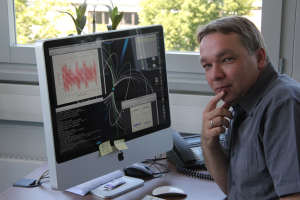Astronomical award for Manchester scientist
14 Jan 2013
A University of Manchester scientist has been awarded a prize for outstanding merit in observational astrophysics.

Professor Michael Kramer, whose research uses the telescopes at Jodrell Bank Observatory, received the 2013 Herschel Medal from the Royal Astronomical Society.
He joined The University of Manchester in 1999 and was appointed professor in 2006, before becoming Associate Director of the Jodrell Bank Centre for Astrophysics from 2007-2009.
Professor Kramer is currently Director of the Max Planck Institute for Radio Astronomy in Bonn, Germany, but retains his appointment in Manchester. He also holds an honorary professorship at the University of Bonn.
He is an international leader in the field of pulsars – extremely compact neutron stars weighing as much as the Sun but only the size of a city, and spinning at rates up to hundreds of times per second.
The extreme gravity of these neutron stars makes them excellent laboratories for testing Einstein's theory of gravity, General Relativity.
Professor Kramer was the first to detect geodetic precession; an effect of the curvature of space-time predicted by General Relativity. He also played a central role in the discovery of the first and only double pulsar system - ranked by Science as the 6th most important scientific discovery of the year 2004.
He said: “I feel very honoured by this reward, and humbled to appear now in a list of my personal heroes who have previously received this reward.
“I’d also like to think that the reward reflects the leading position that Europe plays in radio astronomy – and my field in particular – with the Lovell Telescope at its very centre.”
The Herschel Medal recognises investigations of outstanding merit in observational astrophysics. Previous recipients have included Dame Jocelyn Bell Burnell, for the discovery of pulsars, and Nobel prize winners Arnio Penzias and Robert Wilson, for their discovery of the background radiation from the Big Bang.
The Royal Astronomical Society citation states: "It is difficult to think of an astronomer who has had as much influence on the blossoming of pulsar astronomy and its integration into the rest of astrophysics in the last 20 years as Professor Kramer."
Professor Albert Zijlstra, Director of the Jodrell Bank Centre for Astrophysics, says: "We are delighted with this award. Michael Kramer has made great impact with his studies of general relativity using pulsars, research that has greatly benefited from the use of the University of Manchester's Lovell Telescope.
“He is also playing an important role in the planning for the Square Kilometre Array radio telescope. This award recognises his inspirational use of radio astronomy."
